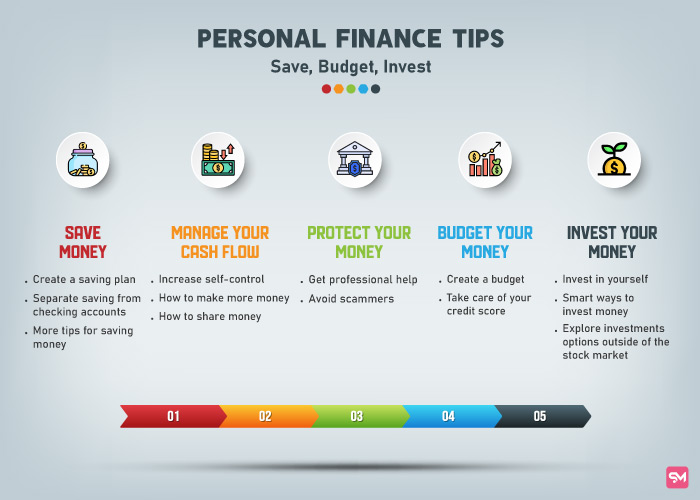Here are some great personal finance tips for beginners: you can read the article simply shared by lots of people.
- Create a budget: Create a detailed budget of income and expenses for each month. This will help you know where money is being spent and how much you can save.
- Save: Set aside a portion of your income every month for savings. This can be beneficial for emergencies or future needs.
- Avoid Debt: Avoid taking unnecessary loans. If borrowing is necessary, understand the interest rate and repayment plan.
- Establish an emergency fund: Establish an emergency fund for any unexpected financial situation. It can save you from financial goals and upcoming problems.
- Set financial goals: Set short-term and long-term financial goals. This will be very helpful in your financial planning.
- Invest: Put your savings into different investment opportunities, such as stocks, bonds, or real estate. This will help you get more profit in the future.
- Insure: Insure your health, property, and life. It will provide financial security in case of any unexpected accident or illness.
- Get financial education: Learn more about finances. Read books, take courses, or seek advice from financial advisors.
- Use Credit Cards Wisely: Use credit cards carefully and always pay on time to avoid interest charges.

- Review Expenses: Review your expenses every month and see where unnecessary spending is happening. Cut unnecessary spending and use the money for savings or investments.
- Live a Simple Life: Adopt simplicity in your life. Avoid unnecessary accessories and wasteful spending. You can save more money by living simply.
- Set financial priorities. Prioritize your financial goals. Satisfy the most important needs and goals first, and unimportant wants later.
- Review your finances regularly. Review your financial situation regularly. Update your financial plans and see if you’re getting closer to your goals.
- Improve your financial literacy: Use a variety of sources to improve your financial literacy, such as financial blogs, podcasts, and videos.
- Do tax planning: Do tax planning so that you can legally minimize your taxes. Know various tax-saving plans and investment methods.
- Seek advice from financial advisors. If you are facing financial problems, seek advice from expert financial advisors. These will help you make better financial decisions.
- Adopt a positive attitude towards money. Adopt a positive attitude towards money. Don’t just think of money as something to spend, but use it wisely.
- Save for retirement: Start saving for your retirement as early as possible. Create a solid plan to avoid financial hardship after retirement.
- Adopt healthy financial habits: Adopt healthy financial habits in everyday life, such as saving daily, spending less, and thinking about every purchase.
These tips will help you become financially stable and secure. By following them, you can be on your way to a better financial future. The Importance of Financial Planning: Securing Your Financial Future
- Study Life Insurance: Choose a life insurance policy to protect you. It influences your decision-making and helps you in your decision-making.
- Build an automated foundation of wealth: Adopt basic automation to build your financial strength. Save daily, and set up an automatic account for loans and savings.
- Get Financial Information: Get information about finances, such as recent changes and opportunities. Use different sources to understand your worth.
- Discuss Values: Discuss values with your family. Include your key decision-makers in your marriage and listen to their opinions.
- Get help with financial protection: Get help with financial protection, whether it’s a financial advisor or financial education materials. It will help you solve financial problems in a better way.
- Be prepared for financial investments. Be prepared for financial investments. Study different investment methods and take appropriate steps for your investment.
- Get financial guidance: Get financial guidance, whether it’s from a friend, family member, or financial advisor. Their guidance will help you with your financial experience.
- Promote Financial Education: Promote financial education and teach your children about its importance. Consult with them to explain savings and investment opportunities.
- Understand the importance of wealth: Understand the importance of wealth and prioritize your financial life. Work to grow and protect your wealth is well.
- Earn self-sufficiency: Work to gain self-worth. Build your finances to give you the material to make self-sufficient decisions in life.
These tips will help you understand financial strength and importance. Putting them into practice is yours
Can strengthen the financial future. To put these tips into practice, assess your worth, set your financial goals, and focus on the things that matter most to you. There may be some difficulties in the way of financial strength but face them with energy and determination. Keep working regularly and persistently, and strengthen the wealth on that basis.








